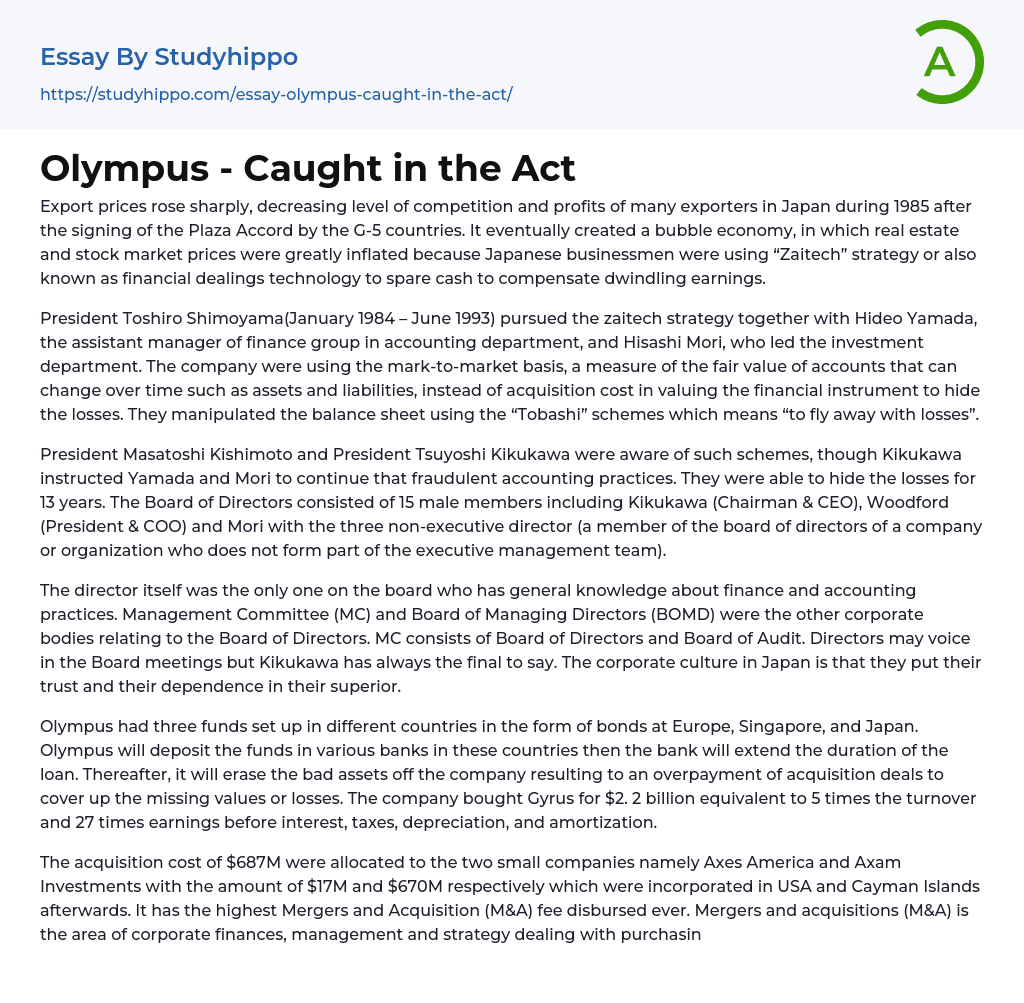Following the signing of the Plaza Accord in 1985, Japan experienced a notable rise in export prices, resulting in decreased competition and profitability for exporters. Consequently, this led to an inflated bubble economy characterized by skyrocketing real estate and stock market prices. In order to address the decline in earnings, Japanese businessmen implemented the "Zaitech" strategy (also referred to as financial dealings technology) as a cost-saving solution.
President Toshiro Shimoyama (January 1984 - June 1993) worked with Hideo Yamada, assistant manager of the finance group in the accounting department, and Hisashi Mori, who led the investment department, to implement the zaitech strategy. The company employed a mark-to-market basis, which measures the fair value of accounts that can fluctuate over time (such as assets and liabilities), instead of using acquisition cost to value financial instruments. This was done to
...conceal losses. They also manipulated the balance sheet through "Tobashi" schemes, which involve "flying away with losses".
President Masatoshi Kishimoto and President Tsuyoshi Kikukawa were aware of the fraudulent accounting practices but Kikukawa instructed Yamada and Mori to continue them. The losses were successfully hidden for 13 years. The Board of Directors comprised 15 male members, with Kikukawa serving as Chairman & CEO, Woodford as President & COO, and Mori as a non-executive director.
The director is the sole member of the board who possesses knowledge in finance and accounting practices. The Management Committee (MC) and Board of Managing Directors (BOMD) are two other corporate bodies connected to the Board of Directors. The MC comprises the Board of Directors and Board of Audit. Although directors have the ability to express their viewpoints during board meetings, Kikukawa holds ultimate authority. I
Japan's corporate culture, employees place trust and depend on their superiors.
Olympus set up three bond funds in Europe, Singapore, and Japan to be deposited into banks within each country. The banks will then extend the loan duration. This arrangement aims to eliminate nonperforming assets for Olympus, leading to overpayments for acquisition deals as compensation for lost value or losses. One significant acquisition was Gyrus, purchased by Olympus for $2.2 billion, equivalent to 5 times turnover and 27 times earnings before interest, taxes, depreciation, and amortization.
The acquisition cost was split between Axes America and Axam Investments, with $17M and $670M each. Both companies were then established in the USA and Cayman Islands. This transaction is the highest Mergers and Acquisition (M) fee ever paid. Mergers and acquisitions (M) encompass the financial, managerial, and strategic aspects of acquiring or merging with other firms. In a merger, two entities join forces to create a new business entity, frequently under a new name.
The company purchased three small venture firms - Altis, Sumalabo, and NewsChef - that were not making a profit. The cost of this acquisition was $773M. In 2011, Woodford was chosen as the CEO of Olympus by Kikukawa, who believed he would be easy to control. This decision to have a foreign CEO was unusual for Japanese companies. Shortly after Woodford's appointment, his German colleagues alerted him to the company's suspicious activities, which they learned about through the magazine Facta Magazine. In response, Woodford enlisted PwC to investigate the company's documents and past actions.
PwC notified Woodford a few days later about potential misconduct at Olympus. In response, Woodford wrote letters to Kikukawa, Yamada, and Mori regarding the
matter. He then convened a board meeting to address the alleged fraudulent activities but ended up discussing his own resignation instead. After leaving, Woodford reported the misconduct to the Serious Fraud Office (SFO) in the UK. On November 24, 2011, Olympus announced that Kikukawa, Yamada, and Mori had resigned. Shuichi Takayama took over as Kikukawa's successor.
- Bank essays
- Banking essays
- Corporate Finance essays
- Credit Card essays
- Currency essays
- Debt essays
- Donation essays
- Enron Scandal essays
- Equity essays
- Financial Accounting essays
- Financial Crisis essays
- Financial News essays
- Financial Ratios essays
- Financial Services essays
- Forecasting essays
- Foreign Exchange Market essays
- Free Market essays
- Gold essays
- Investment essays
- Legacy essays
- Loan essays
- Market Segmentation essays
- Money essays
- Personal finance essays
- Purchasing essays
- Retirement essays
- Shareholder essays
- Stock Market essays
- Supply And Demand essays
- Venture Capital essays




